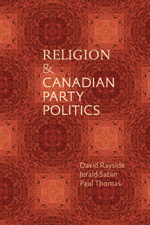
Religion and Canadian Party Politics
Religion is usually thought of as inconsequential to contemporary Canadian politics. Religion and Canadian Party Politics takes a hard look at just how much or how little influence faith continues to have in federal, provincial, and territorial political arenas.
Drawing on case studies from across the country, this book explores the three axes of religiously based contention that have been most influential in Canada. Historically, denominational distinctions between Catholics and Protestants shaped party oppositions across several regions. Since the 1960s, as religiosity experienced a steep decline, a newly politicized divide opened between religious conservatives and political reformers. Then since the 1990s, sporadic controversy has centred on the political and legal recognition of non-Christian religious minority rights. Although the extent of partisan engagement with each of these sources of contention has varied across time and region, this book shows that religion still matters in shaping party politics.
This detailed look at the play of religiously based conflict and accommodation in Canada fills a large gap and pulls us back from overly simplified comparisons with the United States.
More broadly, this book also compares the role of faith in politics in Canada to that of other Western industrialized societies.

Policy Work in Canada: Professional Practices and Analytical Capacities
Policy Work in Canada is an in-depth study into the levels of analytical capacity found within the federal and provincial governments as well as the non-governmental sector. By focusing on the individuals who craft public policy in Canada, this collection of eighteen chapters broadens and deepens our understanding of policy development in Canada.
The contributors to this volume empirically examine such topics as: the inherent characteristics of sophisticated policy analysis, the constraints that influence the outcome or style of analysis, the influence of policy analysis on democratic debate and lessons that can be learned from different jurisdictions within and outside of Canada. Policy Work in Canada provides a pathway for academics and public mangers alike to meet the challenges involved in crafting more nuanced and sophisticated public policy head-on.

Making a Global City: How One Toronto School Embraced Diversity
Half of Toronto’s population is born outside of Canada and over 140 languages are spoken on the city’s streets and in its homes. How to build community amidst such diversity is one of the global challenges that Canada – and many other western nations – has to face head on. Making a Global City critically examines the themes of diversity and community in a single primary school, the Clinton Street Public School in Toronto, between 1920 and 1990. From the swift and seismic shift from a Jewish to southern European demographic in the 1950s to the gradual globalized community starting in the 1970s, Vipond eloquently and clearly highlights the challenges posed by multicultural citizenship in a city that was dominated by Anglo-Protestants. Contrary to recent well-documented anti-immigrant rhetoric in the media, Making a Global City celebrates one of the world’s most multicultural cities while stressing the fact that public schools are a vital tool in integrating and accepting immigrants and children in liberal democracies.
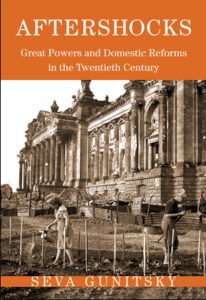
Aftershocks: Great Powers and Domestic Reforms in the Twentieth Century
Over the past century, democracy spread around the world in turbulent bursts of change, sweeping across national borders in dramatic cascades of revolution and reform. Aftershocks is the first book to offer a detailed explanation for this wavelike spread and retreat—not only of democracy but also of its twentieth-century rivals, fascism and communism. Seva Gunitsky argues that waves of regime change are driven by the aftermath of cataclysmic disruptions to the international system. These hegemonic shocks, marked by the sudden rise and fall of great powers, have been essential and often-neglected drivers of domestic transformations. Though rare and fleeting, they not only repeatedly alter the global hierarchy of powerful states but also create unique and powerful opportunities for sweeping national reforms—by triggering military impositions, swiftly changing the incentives of domestic actors, or transforming the basis of political legitimacy itself. As a result, the evolution of modern regimes cannot be fully understood without examining the consequences of clashes between great powers, which repeatedly—and often unsuccessfully—sought to cajole, inspire, and intimidate other states into joining their camps.
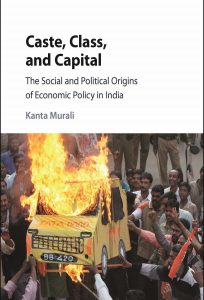
Caste, Class, and Capital – The Social and Political Origins of Economic Policy in India
For millions of poor people in the developing world, economic growth offers prospects for improved well-being. But what are the political and social conditions conducive to growth-oriented policies in poor democracies? This book addresses this highly consequential question by focusing on a specific empirical puzzle – policy variation across Indian states in the competition for private industrial investment, a phenomenon that came to the fore after the country adopted market reforms in 1991. Through the analysis of investment policies, this book offers a novel explanation, which links social identity, class, and economic policy outcomes. Its main findings highlight a link between pro-business policies and exclusionary political trends in India’s high growth phase, and offer a sobering perspective on the current model of growth in the country. It adds to our understanding of Indian political economy as well as to the dynamics of economic development in poor democracies.

Dynasties and Interludes: Past and Present in Canadian Electoral Politics
Dynasties and Interludes provides a comprehensive and unique overview of elections and voting in Canada from Confederation to the recent spate of minority governments. Its principal argument is that the Canadian political landscape has consisted of long periods of hegemony of a single party and/or leader (dynasties), punctuated by short, sharp disruptions brought about by the sudden rise of new parties, leaders, or social movements (interludes). Changes in the composition of the electorate and in the technology and professionalization of election campaigns are also examined in this book, both to provide a better understanding of key turning points in Canadian history and a deeper interpretation of present-day electoral politics.
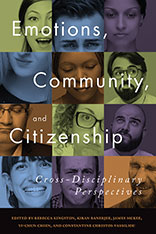
Emotions, Community and Citizenship: Cross-Disciplinary Perspectives
Emotions are at the very heart of individual and communal actions. They influence our social and interpersonal behaviour and affect our perspectives on culture, history, politics, and morality. Emotions, Community, and Citizenship is a pioneering work that brings together scholars from an array of disciplines in order to challenge and unite the disciplinary divides in the study of emotions. These carefully selected studies highlight how emotions are studied within various disciplines with particular attention to the divide between naturalistic and interpretive approaches. The editors of this volume have provided a nuanced and insightful introduction and conclusion which provide not only an overarching commentary but a framework for the interdisciplinary approach to emotion studies.

The Death and Life of the Urban Commonwealth
The city is a paradoxical space, in theory belonging to everyone, in practice inaccessible to people who cannot afford the high price of urban real estate. Why should access to public and social goods be tied to the ability to acquire private property? When people lose access to the urban commons, they are dispossessed of something to which they have a rightful claim. What kind of right is the right to the city? Political theory has much to say about individual rights, equality, and redistribution, but has largely ignored the city. In order to fill this lacuna, this book draws on a largely forgotten political theory called solidarism. Solidarism’s justification of social rights is particularly relevant to conflicts about urban space. The book uses solidarism to interpret the city as a form of common-wealth, a concentration of value created by past generations and current residents. This approach helps us rethink struggles over gentrification, public housing, transit, and public space.
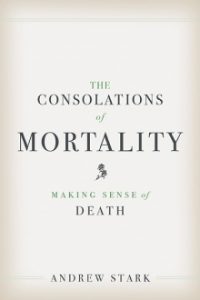
The Consolations of Mortality – Making Sense of Death
For those who don’t believe in an afterlife, the wisdom of the ages offers four great consolations for mortality: that death is benign and good; that mortal life provides its own kind of immortality; that true immortality would be awful; and that we experience the kinds of losses in life that we will eventually face in death. Can any of these consolations honestly reconcile us to our inevitable demise?
In this timely book, Andrew Stark tests the psychological truth of these consolations and searches our collective literary, philosophical, and cultural traditions for answers to the question of how we, in the twenty-first century, might accept our mortal condition. Ranging from Epicurus and Heidegger to bucket lists, the flaming out of rock stars, and the retiring of sports jerseys, Stark’s poignant and learned exploration shows how these consolations, taken together, reveal death as a blessing no matter how much we may love life.

The Making of Grand Paris – Metropolitan Urbanism in the Twenty-First Century
In 2007 the French government announced the “Grand Paris” initiative. This ambitious project reimagined the Paris region as integrated, balanced, global, sustainable, and prosperous. Metropolitan solidarity would unite divided populations; a new transportation system, the Grand Paris Express, would connect the affluent city proper with the low-income suburbs; streamlined institutions would replace fragmented governance structures. Grand Paris is more than a redevelopment plan; it is a new paradigm for urbanism. In this first English-language examination of Grand Paris, Theresa Enright offers a critical analysis of the early stages of the project, considering whether it can achieve its twin goals of economic competitiveness and equality.
Enright argues that by orienting the city around growth and marketization, Grand Paris reproduces the social and spatial hierarchies it sets out to address. For example, large expenditures for the Grand Paris Express are made not for the public good but to increase the attractiveness of the region to private investors, setting off a real estate boom, encouraging gentrification, and leaving many residents still unable to get from here to there.
Enright describes Grand Paris as an example of what she calls “grand urbanism,” large-scale planning that relies on infrastructural megaprojects to reconfigure urban regions in pursuit of speculative redevelopment. Democracy and equality suffer under processes of grand urbanism. Given the logic of commodification on which Grand Paris is based, these are likely to suffer as the project moves forward.